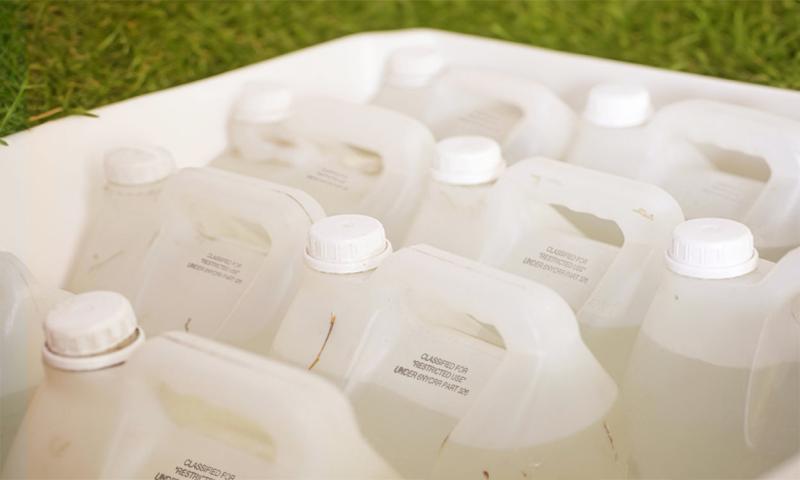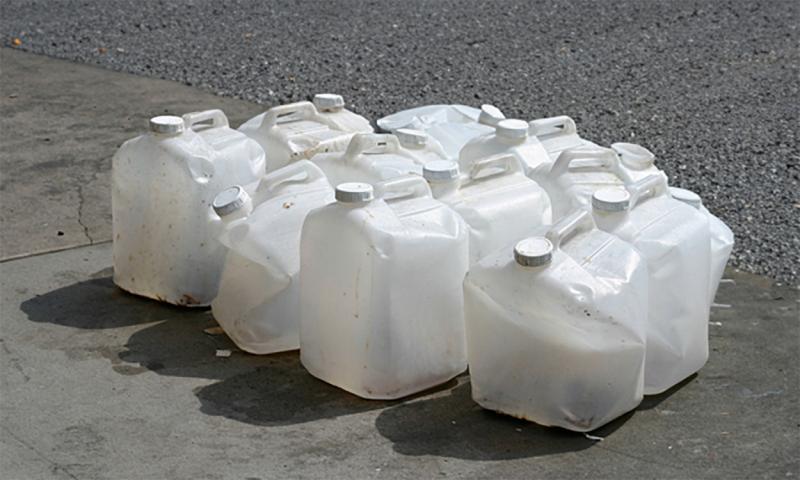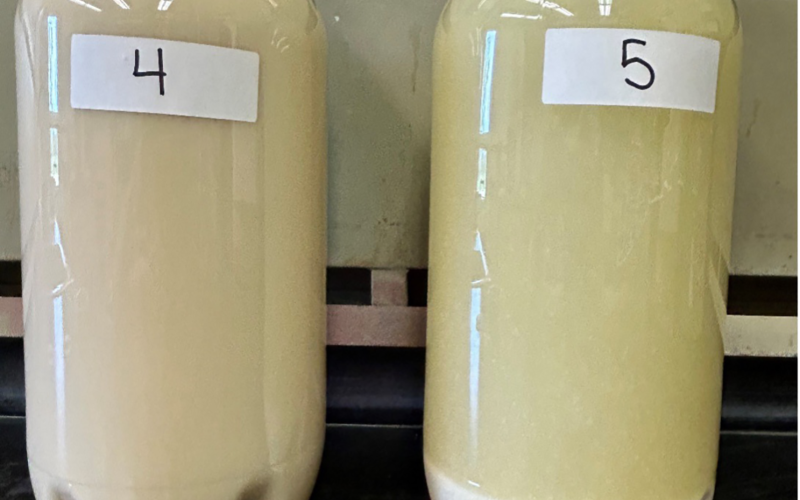Pesticides are toxic chemicals intended to kill, repel, or otherwise mitigate pests and the damage they cause. Although they are intended only to affect pests, pesticides can have negative consequences for unintended targets, such as humans and wildlife, which makes pesticides and their wastes biohazards. As such, there are specific steps you need to take when disposing of unused pesticides to comply with regulations.
Important: Always wear your full personal protective equipment (abbreviated as PPE) when handling pesticides (including expired products) and their containers. Do not use waste pesticides. It is illegal to store waste pesticides in any way inconsistent with the original label. It is illegal to burn waste pesticides or pour waste pesticides down the drain. Follow the instructions below to safely dispose of waste pesticides.
Safe Disposal of Waste Pesticides
Store waste pesticides until they can be safely discarded.

Store waste pesticides together, away from usable pesticides, and according to the original label. If full label storage instructions are unavailable, store waste pesticides like your most-toxic waste pesticides.
Waste pesticides that are outside of their container should be placed into an empty, clean pesticide container or another sealable, high-density polyethylene (abbreviated as HDPE) container.
Damaged containers with solid pesticide wastes should be sealed with duct tape prior to storage. Damaged containers with liquid pesticide wastes should be placed into HDPE totes or bowls for storage.
Store solid waste pesticides above liquid waste pesticides.
Transport waste pesticides for drop off at an authorized location.
Waste pesticides may be dropped off at the South Dakota Department of Agriculture and Natural Resources’ (abbreviated as DANR) waste pesticide collection site in Pierre or select waste collection facilities in the state. For Pierre, contact Spike King at (605) 773-3153 or by email to schedule a drop-off time to ensure someone will be available to assist you. For other locations, contact city waste collections in your area to determine if and how you can discard waste pesticides through them. For more information, visit the DANR’s Waste Management in South Dakota page.
Ensure that damaged containers containing solid pesticide products are sealed with duct tape prior to loading for transport. Place damaged containers with liquid pesticide products into a chemically resistant plastic tote or bowl for transport. Transport containers with pesticide wastes secured outside of your vehicle to prevent contamination inside and avoid personal exposure during transport. If you are unable to follow these instructions, store pesticides in their original containers until a pickup can be arranged.
Schedule to have waste pesticides picked up from your property.
The DANR offers waste pesticide collection for the state at no cost. Waste pesticide pickups are coordinated with local waste collection facilities (where available) and landowners. To initiate a waste pesticide pickup with the DANR, call or email Spike King with the product details and condition. Waste pickups are prioritized based on product toxicity, demand in the local area, and availability of DANR waste collection agents. Store waste pesticides according to label specifications until they can be collected.
Instructions for Specific Types of Waste Pesticides
Damaged Containers

Pesticide products in damaged containers may have been exposed to reactive chemicals or environmental conditions, such as humidity, that change the chemistry of the products, making them more or less toxic, less effectual, or even less usable. Discard pesticides in damaged containers to avoid risks to applicators, workers, equipment, and the environment. Seal damaged containers with solid pesticides using duct tape prior to storage. Place damaged containers with liquid pesticides into a chemically resistant tote or bowl for storage (HDPE plastics are recommended).
Spills or Leaks
Pesticides that have been spilled or have leaked out of the container are contaminated and are no longer represented by the original label. They should be collected as soon as possible and stored for disposal. Collect solid pesticides with a designated or otherwise clean broom and dustpan; do not use a vacuum cleaner. Collect liquid pesticides with an absorbent material, such as cat litter or sand, and treat the contaminated absorbent material as a solid pesticide. Deposit collected pesticides into clean, unused pesticide containers, or other sealable, high-density polyethylene (HDPE) containers for storage.
Unidentifiable Products
If a product cannot be identified, it cannot be used properly. Do not apply unidentifiable products. Handle unidentified products as though they had the highest toxicity rating, wearing full PPE to handle containers and/or product as needed to prepare them for disposal. Follow the collection instructions provided for Spills or Leaks if the pesticide product is outside of its original container.
Missing or Damaged Label
Products without labels or with labels damaged beyond readability (for any portion of the label) can no longer provide all the required information for safe applications. As such, any application with these products will be off label. Store these products with other waste pesticides without using them.
Expired Pesticides
Unless otherwise stated, pesticide products expire after two to three years. Expired products may have broken down into components that behave differently on or in pest applications and non-targets, which invalidates the label. Applying expired pesticides will likely not result in the desired control and may damage or harm unintended targets, like crops and beneficial insects. Store expired pesticides with other waste pesticides until they can be appropriately discarded.
Vacated Registrations
It is illegal to use a product whose registration has been vacated or canceled by the Environmental Protection Agency (abbreviated as EPA) unless specific provisions are provided by the EPA for limited or temporary use. Use these products where permission is provided, but make plans to discard any unused product by the end of the provisional period. The EPA provides notifications when pesticide product registrations have been vacated. These notifications are duplicated by the SDSU Extension and the DANR. You can monitor the current national and state registration status of any pesticide product at any time by searching the EPA’s Pesticide Product and Label System or the DANR’s Pesticide Product Search, respectively, using any one of several search criteria.


